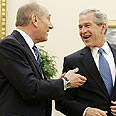
Buddies
צילום: רויטרס
The blind and the cripple
Meeting between Bush, Olmert didn't offer any practical results
Washington: At the end of their orchestrated performance before the press, the two got up from their seats. Olmert put his arm around Bush's shoulder. Bush returned the gesture. Olmert lightly patted the hand resting on his shoulder. Bush reciprocated with a typical Israeli slap on the back.
The chemistry was apparent as the two walked off arm in arm. The fact that the two figures' combined approval rating is below 50 percent hasn't pulled them apart. Perhaps even the contrary is true.
The crippled shall help the blind, said our forefathers. The cripple in this analogy is Bush, while the self inflicted blind man is Olmert. Their outward joy is somewhat confusing. What are they so content about? Is it about the situation in Iraq or perhaps Iran's armament? Perhaps they are content with the level of support each is enjoying amongst their respective publics.
No. But if not everything is a game for the sake of appearances, it still looks like they are content at being there inside the Oval Office, the office where the fate of the world is determined, rather than being in some other less fascinating place.
There was no trace of the despondency that prevailed during the difficult times when Rabin or Sharon or Nixon sat in office. In Bob Woodward's Book "A State of denial" he writes that when Bush was being briefed for the first time since taking up office he admitted: I don't have the foggiest idea about what I think about international, foreign policy.
I don't exactly know what was agreed between Olmert and Bush regarding the Iranian issue. The two spoke privately, which on the one hand lends the conversation a dramatic dimension, but on the other leaves the interpretations in their separate hands. Such discussions have not wielded positive outcomes on the practical level. They oblige the listener more than they do the orator.
Just a short stopover
On his flight to Washington, Olmert said that his meeting with the president was simply a stop on the way to his appearance before Jewish community leaders in Los Angeles; just a short stopover to visit a friend.
This time they didn't issue a joint statement, and instead of holding an open press conference, the president preferred answering four questions posed by the press – two from American reporters and one each from Israeli Channel 1 and the Yedioth Ahronoth newspaper.
Nonetheless, if this meeting will ever enter the annals of history, it would only be due to the exchange of ideas on the Iranian issue, providing there was such exchange. Everything else is on hold: The Palestinians are waiting for a change of leadership; the Iraqi issue is waiting for the consolidation of a new bi-partisan policy in the US. The Syrian issue is waiting for confidence building measures on Assad's part. Yet, none of these seem to be in the offing.
During their short lunch the president asked about Israel's economic situation. Olmert told him what a successful year we had had; how our economic growth is expected to reach 4.6 percent and how a positive balance of payments is expected. What did you do with the change, the president asked and Olmert replied: It helped us pay the costs of the war in Lebanon.
And then Bush popped the next question: What are the pension arrangements like in the State of Israel? Olmert responded the best he could. Is Bush becoming concerned about his pension? Olmert rejected the malicious thought. Perhaps the president is concerned about Olmert's pension? Olmert rejected this idea as well. No, the president just felt like asking, for no particular reason.










